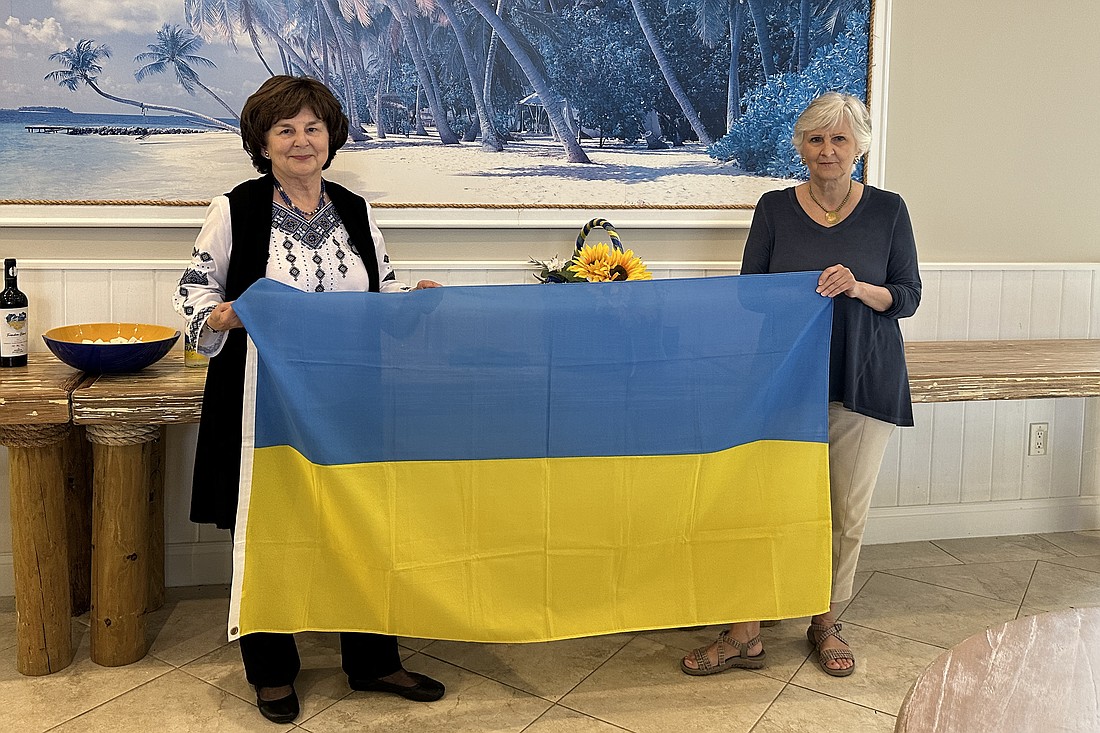- January 10, 2025
-
-
Loading

Loading

The Russia-Ukraine war isn’t over. Yet in some areas of Ukraine, people are trying to go about their daily lives, shopping and enjoying music amid sporadic air raid sirens.
That was just one of the messages that Tania Vitvitsky touched on during her presentation to the group of about 20 residents gathered on Jan. 29 at the Shore Condominium social room.
Vitvitsky was born to Ukrainian parents in a displaced persons camp in Austria as post-World War II refugees. She then arrived in the U.S. with her family at the age of 3 and spent most of her professional life in Massachusetts.
She has visited Ukraine every year since 1990, except for the peak of the COVID-19 pandemic. She recently spent eight weeks in the country and returned in November.
Her longtime friend and Longboat Key resident Anisa Mycak has organized discussions about the conflict in Ukraine since 2014, and invited Vitvitsky to talk to others about her recent trip.
In her presentation, Vitvitsky said people in many parts of Ukraine are trying to continue everyday lives. Children are going to school, people meet at coffee shops and plazas are busy.
Instead of showing pictures of the war, Vitvitsky showed the Shore residents what life is like in these cities. Like in Rynok Square, where she said people were enjoying a saxophone melody played by a musician on a balcony.
“So in the middle of war, you could say, 'Well, why are people having a good time?’ Well, they have to live because they could be dead the next day,” Vitvitsky said.
The conflict began in 2014, she said, with the annexation of Crimea by Russia. On Feb. 24, 2022, the invasion of Ukraine from Russia began what has now led to a heightened conflict.
When the invasion began, Vitvitsky was inspired. “I felt like I wanted to do something,” she said.
From there, she became more active with humanitarian efforts, volunteering with various organizations. Vitvitsky also recently founded Ukrainian Education Platform, a nonprofit that works with organizations throughout Ukraine to help internally displaced mothers and children.
“It was eye-opening to meet people who did not flee, that are staying behind, and doing what they can to ameliorate the situation, to work with their families, to help people with humanitarian aid or if needed to evacuate them,” Vitvitsky said.
On this recent trip to Ukraine, Vitvitsky said the air raid sirens were less frequent. The warnings, she said, are a “complete disruption” of life. At the start of the conflict in 2022, those sirens were at least every other day, sometimes several times a day, according to Vitvitsky.
She recalled that on her latest trip sirens went off once while she was volunteering with a children’s program. The volunteers walked the children across the street to a monastery, into the bomb shelter in the basement.
Vitvitsky showed a picture of the children, some smiling.
They don’t look very upset, she said, because they’re used to it.
Another difference in her recent trip was that supplies are more readily available. When she was taking trips the past couple of times, she would have to bring upwards of four suitcases, including medical supplies.
Now, Vitvitsky said she’s able to buy almost anything there.
“It's pretty remarkable that a lot of stuff really functions despite the war,” she said.
But her presentation ended on the topic that the war isn’t over, and stressed the importance of keeping this conflict at the forefront of everyone’s minds.
She paraphrased a quote from U.S. Secretary of State Antony Blinken: “If Russia stops fighting, there is no war. If Ukraine stops fighting, there is no Ukraine.”
This sparked a lively, hourlong conversation among the audience, many of whom stressed how the Russia-Ukraine war is a global issue and that other countries can’t look away from a situation like this.
Vitvitsky and Mycak both said that sending messages — via phone calls, emails, letters, etc. — is an important way to make the opinions heard. Mycak also distributed a list of organizations that people could donate to.